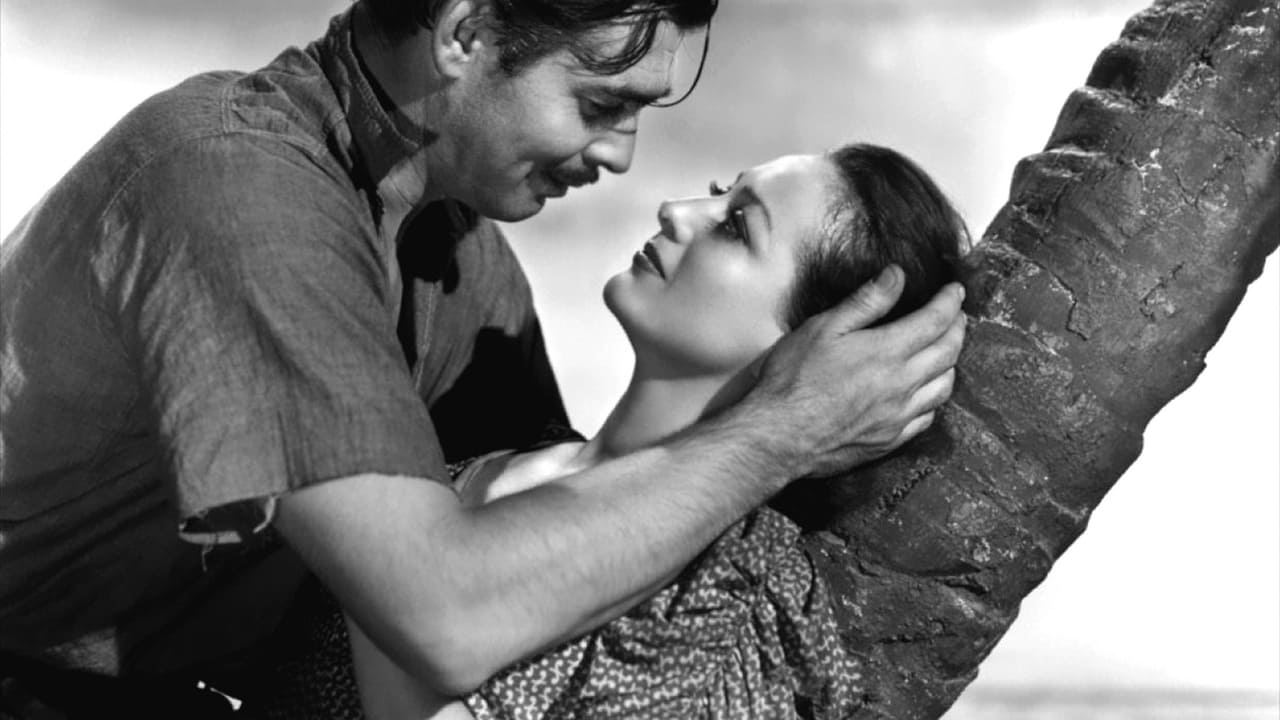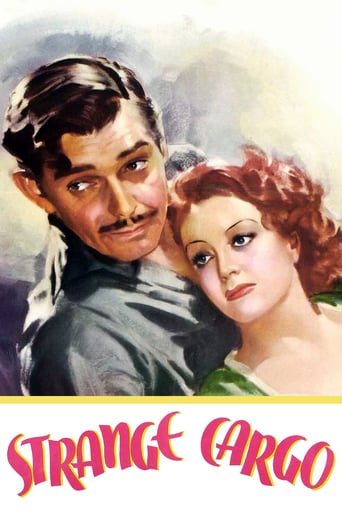Hellen
I like the storyline of this show,it attract me so much
Stometer
Save your money for something good and enjoyable
Glimmerubro
It is not deep, but it is fun to watch. It does have a bit more of an edge to it than other similar films.
Guillelmina
The film's masterful storytelling did its job. The message was clear. No need to overdo.
edwagreen
An incorrigible Clark Gable seeks to constantly escape from a penal colony in Guiana in this 1940 production.After several failed attempts and punishments ranging from solitary confinement for periods of over a year, he and others finally succeed.Joan Crawford is a tough talking lady who is banished from the colony when Gable, during one of his attempts to escape, is discovered in her room.There is a fine supporting cast led by Ian Holm as an optimist,Paul Lukas as a pessimist and Peter Lorre as the Pig. He'll sell anyone out for the mighty dollar.There is also an inspector Javert character. Eduardo Ciannelli is totally out of his character with a fine performance as a religious convict who loses faith only to regain it before death. Holm is a religious type convict. There is also a young guy, once a medical student. It is hard to fathom how some of these characters turned against the law.The ending may be a surprise to others. Does religion always win out?
vincentlynch-moonoi
When I first began watching this film I almost turned if off. The idea of a less than prim woman meeting a man in a penal colony just seemed so outlandish. Fortunately, I stuck with it, and it turns out to be a very good film that is far more complex that one might first imagine. The Joan Crawford angle remains, but that doesn't detract from a more realistic prison escape tale.There are actually 3 different stories being told here: Gable and the other escapees, Crawford and her exodus, and what is between Gable and Crawford. And for much of the movie, the 3 tales are separate, making each more interesting. And then there's the allegorical figure of Cambreau, brilliantly played by Ian Hunter in one of his very best roles.There are some wonderful scenes here, including Gable falling into quicksand and great special effects during the storms at sea...for starters. And, thankfully the print being shown on TCM is extremely crisp and clean.The cast here really is quite good. Joan Crawford doesn't overact here...really conducts herself quite well...appears very plain and nearly without makeup most of the movie. Gable is Gable, which is enough in any movie, but here it's interesting to note that this is such a very different film and character from the little flick he made just before this one -- "Gone With The Wind". Incidentally, it's interesting that Crawford got top billing here over Gable! As mentioned, Ian Hunter has one of his very best roles in this film. Peter Lorre has an interesting character...sleazy...essential at the beginning and ending of the film. Paul Lukas is an actor I am often impressed with, though not so much here...not bad, but not outstanding as he often was. Albert Dekker is believable and restrained as the most evil among the prisoners escaping; I wondered if there was the implication of homosexuality in his character and his relationship with a younger prisoner. J. Edward Bromberg has an interesting little role as a sniveling prisoner, although his importance wanes through much of the film. Eduardo Ciannelli is one of those character actors who was always so good, and is here. John Arledge is rather forgettable. Frederick Worlock is convincing as the warden.The role of Ian Hunter...hmmmm...was he Christ? I think the answer is yes. Note in particular when he is floundering in the sea...he holds onto the piece of wood almost as if it is the cross. Very interesting.Highly recommended!
robert-temple-1
This film is pure 'Hollywood hokum'. It is based upon a novel called 'Not Too Narrow … Not Too Deep' by Richard Sale, which may or may not have been interesting; it would take research to find out! The story in the film takes for granted many incidents and much background which obviously existed in the novel but are nowhere to be seen in the film, so either the film was savagely cut or the screenplay was a mess from the start. There is not one millisecond in this film which is remotely realistic, either in terms of events or characters. It is pure Hollywood fantasy in every respect. Two well-known actors, Paul Lukas and Peter Lorre, are so under-used and wasted that there was no point in their being in the film at all. They must have been thrown into the mix in the manner in which one adds a sprinkling of chopped chives to an omelette, hoping that the flavour will be enhanced. The film is a ponderous attempt at producing a 'morality tale', and is so corny that it is laughable. The story concerns some hardened criminals imprisoned in French Guiana who want to escape from their French colonial prison through a jungle (very much a Hollywood set jungle, with a rubber snake). Naturally there has to be a woman in the story, so Joan Crawford hams it up as a down-on-her-luck tramp who for some reason becomes irresistible to Clark Gable, one of the escaped criminals. Crawford in escaping through the jungle wears high-heeled shoes and keeps her makeup fresh. Gable flirts and grimaces and makes mawkish expressions, crinkling his brow as was his wont, smirking and looking suggestively at everybody, which was his manner of acting. It is hard to treat such a character as a hardened criminal when he is always trying so hard to be Clark Gable that surely he hasn't any time left to be a thief. (Attention-seekers are by definition too busy to steal and unsuited to a task which requires that people NOT see them.) The whole escapade is so ridiculous that it can only be regarded as light entertainment. An attempt at religiosity and 'depth' is made by injecting into the story a mysterious 'angel of mercy' who voluntarily walks into the prison and pretends to be an inmate. He helps in the escape and accompanies all the criminals and ministers to their various deaths, helping them to find 'peace' in their last gasps. This character is played very well by Ian Hunter, who retains throughout a convincing air of secret knowledge, smiles enigmatically, makes cryptic prophetic remarks, and has a small spot trained on his face to give him a heavenly glow. The theme is meant to be redemption. You might call it the Donald Duck version of 'Hollywood Goes Moral and Gets Heavy'. For real depth, Hitchcock's 'I Confess' of 1953 shows how it should really be done. By contrast, this piece of trivial nonsense shows just how bare the cupboards of Meaning were in Tinsel Town, and that when they went rummaging for something that might mean something, all they could come up with was, you guessed it, more tinsel.
bkoganbing
The Strange Cargo referred to in the title is in the person of Ian Hunter who is a mysterious other world convict who comes upon a group of them planning to escape from Devil's Island. It's a strange film, Strange Cargo with Clark Gable and Joan Crawford in the very last of eight films they were paired in by MGM.Crawford dusts off her Sadie Thompson role for her character here. Even with the Code firmly in place it's rather obvious that Crawford is a working girl. She's free, but stranded on that notorious convict island. Gable is essentially the same cynical tough guy he played in so many MGM features at that time.Ian Hunter is the mysterious stranger among them. These aren't a group of choir boys he comes among. Yet one by one as they die he brings a peace that passeth all understanding as the Good Book says. The escapees all don't die, but all but one come under his influence.I'm surprised that TCM did choose this one for its theme this June of gays in the cinema. Prison films even during the days of the Code were a bit more open in treatment of homosexuality. The relationship of Albert Dekker and young John Arledge is rather obvious. Dekker in fact chooses a gruesome suicide rather than live without Arledge after he dies. In fact what's really startling to me was that the heavenly figure that Ian Hunter represents neither condemns suicide or homosexuality. I'm really wondering how the censors of the day let that one slip through. Paul Lukas has a very interesting part. He's today what we would consider a serial killer, he's married and killed many women for their money. He's cool and cynical and rejects Hunter's entreaties. When Hunter says they will never meet again, the line is loaded with implications.Strange Cargo is a strange film. It's not bad, but could have been a lot better without code restrictions.

